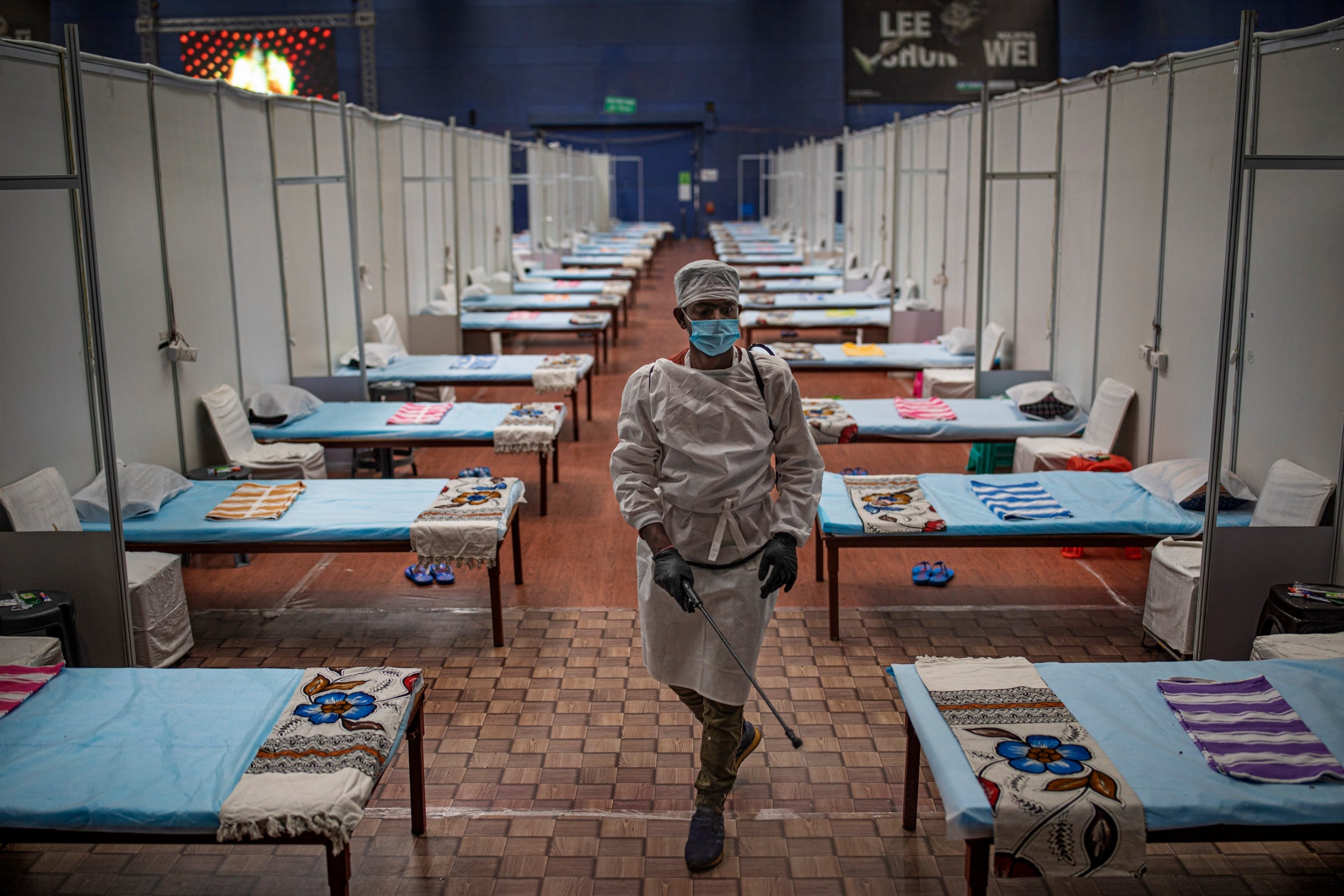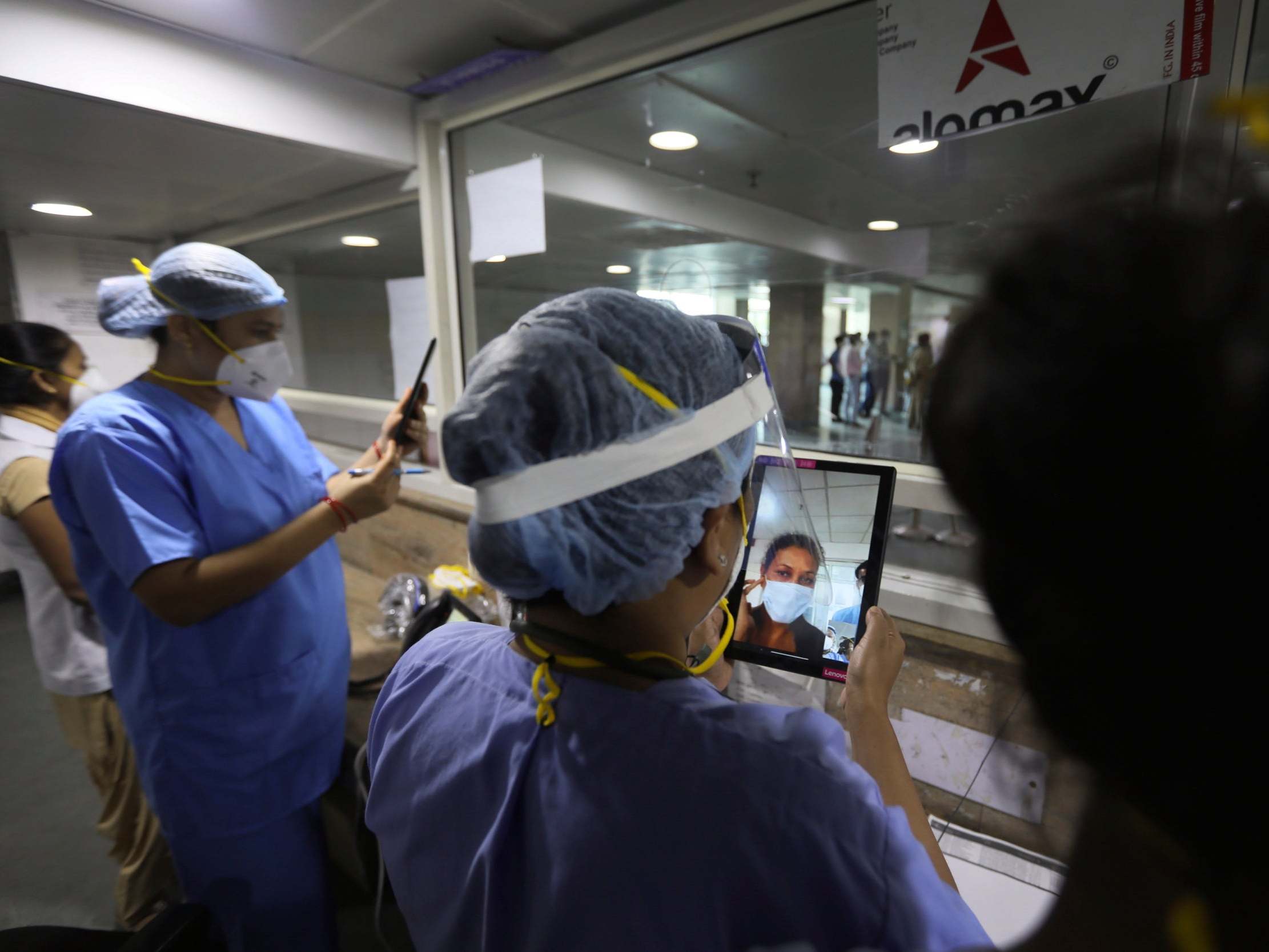Delhi’s hospitals ‘on edge of being overwhelmed’ as coronavirus cases continue to soar
Doctors call for new lockdown to give ‘breathing space’ to hospitals amid high-profile cases of patients being turned away, as Adam Withnall reports


Your support helps us to tell the story
From reproductive rights to climate change to Big Tech, The Independent is on the ground when the story is developing. Whether it's investigating the financials of Elon Musk's pro-Trump PAC or producing our latest documentary, 'The A Word', which shines a light on the American women fighting for reproductive rights, we know how important it is to parse out the facts from the messaging.
At such a critical moment in US history, we need reporters on the ground. Your donation allows us to keep sending journalists to speak to both sides of the story.
The Independent is trusted by Americans across the entire political spectrum. And unlike many other quality news outlets, we choose not to lock Americans out of our reporting and analysis with paywalls. We believe quality journalism should be available to everyone, paid for by those who can afford it.
Your support makes all the difference.Living in a country like India where there is such a stark divide between those who can afford private healthcare and those who cannot, Lakhjeet Singh’s family believed they had the means to access the best treatment during the coronavirus pandemic.
So when the 68-year-old Delhi business owner started to experience a fever in late May, even when he tested positive for Covid-19 six days later, the family “didn’t actually panic”, his son-in-law Mandeep Singh tells The Independent.
It was only three days later, when Lakhjeet’s temperature reached 38C and the family started making increasingly frantic calls to hospitals, that they got scared. They set out in their car, but one after the other, Delhi’s premier healthcare facilities – the finest in India – turned the family away. He lost consciousness as doctors at a sixth hospital were refusing to let the family bring him in, and was dead within 15 minutes.
India’s prime minister Narendra Modi enacted from 24 March one of the world’s strictest and earliest national lockdowns to stem the spread of Covid-19, but by May was forced to begin lifting restrictions as the economy buckled under the strain.
With religious gatherings, restaurants and malls opening up from early June, the number of coronavirus patients in the capital started to sharply rise, up to a peak of nearly 4,000 new cases a day on 23 June.
As the rising numbers have made Delhi the worst-affected hotspot in India, the capital’s government has insisted there is no need for a new lockdown, and its bespoke app for finding hospital beds has consistently shown plenty of vacant slots.
Yet the reality on the ground for patients like Lakhjeet Singh, and the dozens of others whose similar stories have sparked outrage in the Indian media, is of a city whose healthcare system is failing.
“We are right on the edge of being overwhelmed,” says Dr Sumit Ray, head of critical care at the 350-bed Holy Family Hospital in the city’s south east.
Delhi has around 1,900 intensive care unit (ICU) beds in total, and these have filled up as fast as they can be allocated to coronavirus patients, Dr Ray says.
Across India, state governments including Delhi have boasted of adding to bed capacity during lockdown by converting trains, banquet halls, hotels and stadiums. But without the expertise and specialised equipment like ventilators or high-flow oxygen support that an ICU bed can offer, these measures are no help to the more seriously ill.
“When the s**t hits the fan with Covid you need the ICU, because people are dying primarily of respiratory failure,” Dr Ray says. “Just increasing [the number of] any kind of beds is of no value in this situation.
“We are at full capacity. A little more of a surge and we will tip over, and once we do the mortality will just jump dramatically, because if you cannot provide a ventilator to a patient who requires it then they are going to die.”
A shortage of ICU beds could explain why hospitals have been rejecting critical cases like Lakhjeet Singh’s, even when the Delhi government’s app suggests they have potentially hundreds of free beds on wards.
His son-in-law believes that for the doctors who turned them away, “their intent was to not get severe cases of Covid, to not have their [death] case numbers increasing”.
“We have lost total faith in the system,” Manpreet says. “The government, the entire healthcare machinery all failed to build a system that says to people ‘Yes, you may get unwell, but we will tackle it’. I don’t know whether to call it a betrayal, whether it is a loss of trust, but I think it is a very dangerous situation to be in, because you know that however sick you get the hospital won’t see you.”
Lakhjeet Singh’s case gained national attention after his daughter, 38-year-old Amarpreet Kaur, tweeted about her father’s deteriorating health condition as events unfolded. At 9am on 4 June she finally tweeted: “He is no more. The government failed us,” a message that was shared by tens of thousands of people.
Her husband Manpreet says it became clear only later that some hospitals could indeed find space for their family members – two of whom tested positive following their contact with Lakhjeet – once people with political connections started taking an interest in the case.
There was an outcry last month when Karnataka state admitted it had reserved some 100 “deluxe” beds for any MPs, local politicians or senior bureaucrats who fell ill with Covid-19, but Manpreet says there “at least they are being open about it”.
“There seems to be some kind of unsaid rule that hospital beds will be held back to be given only to a certain class of the population,” he says. “Your money won’t help, but if you are lucky your connections might.”
Since the 23 June daily new case numbers in Delhi have started to tail off, with the toll on Tuesday down to 2,008. The capital’s deputy chief minister Manish Sisodia has said the figures, coming amid an increase in testing, suggest some neighbourhoods may even be developing some “herd immunity”.
But Dr Ray believes the capital needs a new localised lockdown “just to give breathing space for the healthcare system”, citing other large cities like Chennai which have done so after much smaller spikes in cases.
He says a rolling two-week return to stay-home orders would give the government time to boost capacity and save lives. “I think we need at least two weeks, and then if it really seems like things are back under control we can reopen it. [Meanwhile] get in more ventilators, more oxygen, and increase the ability of the healthcare system to deal with it.”
It’s not a view shared by Dr Debashis Dhar, a senior critical care consultant at Sir Ganga Ram Hospital, even though he admits the hospital’s ICU “is full” and has been seeing large numbers of patients since early June. It was at Sir Ganga Ram that Lakhjeet Singh received his positive test, after which the family says they were unable to make contact with his doctors despite repeated attempts over the phone.
Dr Dhar says the key is to tackle the stigma around treating Covid-19 patients, with wall-to-wall media coverage of the pandemic and the unprecedented nationwide lockdown having created “an element of fear” among hospital staff.

“The mortality of this pandemic is actually much less than what we saw with H1N1 (in 2009), but the disorder and fear associated with it this time is unparalleled,” he says. “We are hearing every day that this doctor or that nurse has died, it is the first news on every channel and in every paper.
“That is why the care might have suffered, why it might be suffering in every place. A paradigm shift has happened where people are more bothered about their own safety rather than the care they are giving to the patient.
“This is really a matter of shame for all of us.”
For Lakhjeet Singh’s family, the experience of the past weeks has left them vowing never again to put their lives in the hands of Delhi’s healthcare system. They have bought medicines, equipment, oxygen tanks – “everything except for a ventilator” and set up their own “hospital at home”.
“The healthcare system forgot we existed,” Manpreet says. “I think every country is reacting in a different way, and India is reacting in this way, by alienating people. Whenever you say the word Covid suddenly you are no longer part of a system or a society. We felt we cannot depend on the healthcare system – so let’s just do everything for ourselves.”
Join our commenting forum
Join thought-provoking conversations, follow other Independent readers and see their replies
Comments